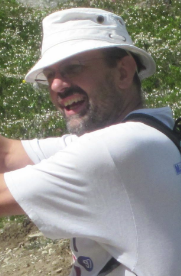Artificial Intelligence, AlphaGo, and Computer Hex
In 2016 DeepMind astonished the Go world with its superhuman-strength program AlphaGo. I will give a brief history of AlphaGo and discuss and its influence on current board game research, including computer Hex. Hex is the connection board game invented by Piet Hein in 1942 and introduced in North America by John Nash around 1949. Our research group at the University of Alberta has built strong Hex players and solvers.
Date and Time
Location
Hosts
Registration
-
 Add Event to Calendar
Add Event to Calendar
- UBC, Okanagan Campus, 3333 University Way
- Kelowna, British Columbia
- Canada
- Building: ASC
- Room Number: 301
- Contact Event Host
- Co-sponsored by UBC Okanagan
Speakers
 Dr. Ryan Hayward of Department of Computing Science University of Alberta
Dr. Ryan Hayward of Department of Computing Science University of Alberta
Biography:
Ryan Hayward received his B.Sc. and M.Sc. in mathematics from Queen’s University (Kingston) in 1981 and 1982 and his Ph.D. in computer science from McGill University in 1987.
His doctoral thesis, Two Classes of Perfect Graphs, was supervised by Vaclav Chvatal. From 1986 through 1989 he was assistant professor in the Department of Computer Science at Rutgers University, after which he held an Alexander von Humboldt fellowship at the Institute for Discrete Mathematics in Bonn for 1989-90. From 1990 through 1992 he was assistant professor in the Department of Computing Science at Queen’s University. From 1992 he was assistant and then associate professor in the Department of Mathematics and Computer Science at the University of Lethbridge, until in 1999 joining the Department of Computing Science at the University of Alberta, where he was promoted to professor in 2004.
He has supervised 13 graduate and 29 undergraduate students, some of whom later became university professors. His current research interests include algorithms for two-player games.
His group (including at times Yngvi Bjornsson, Michael Johanson, Broderick Arneson, Philip Henderson, Jakub Pawlewicz, and Aja Huang — later lead programmer of AlphaGo) has built the world’s strongest computer Hex player, and has solved two 1-move 10×10 Hex openings and all smaller-board openings. With Bjarne Toft, he is writing a book on the history of Hex,
to be published in 2018.
Address:University of Alberta, , Edmonton, Alberta, Canada

